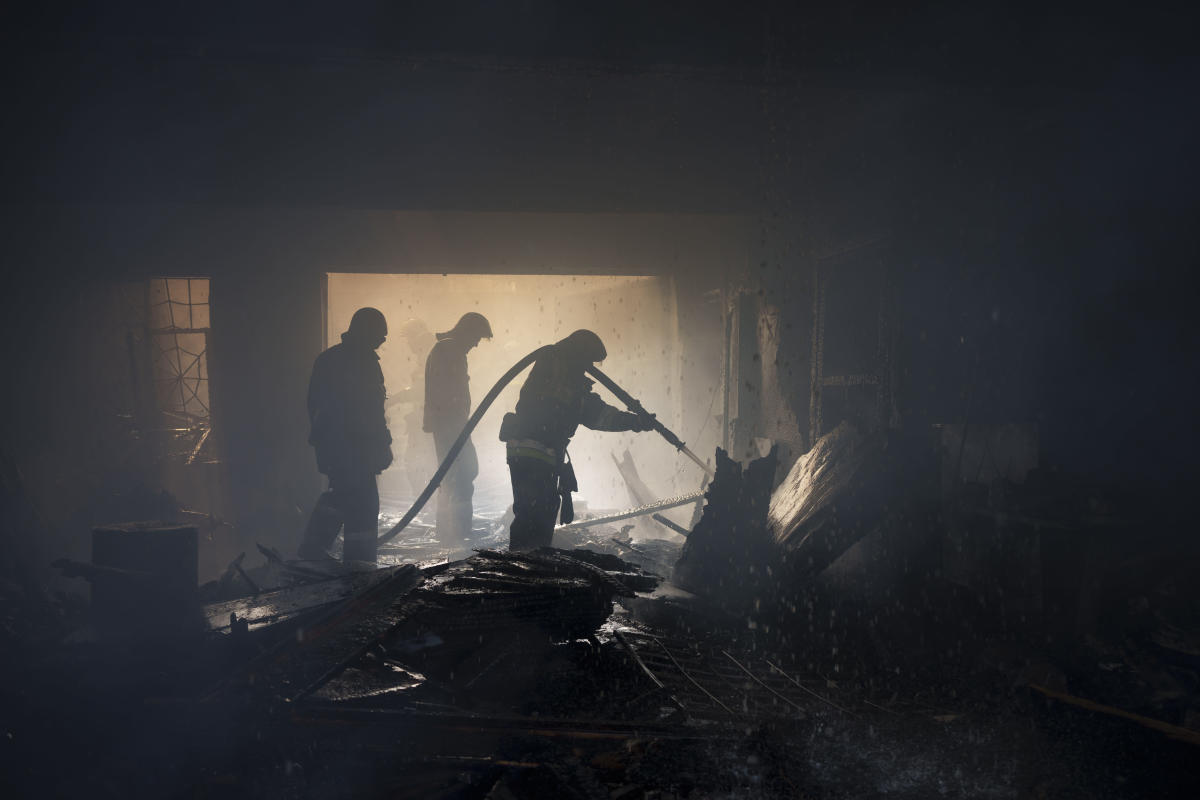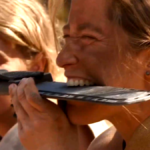
VIENNA — Austrian Chancellor Karl Nehammer says his meeting with Russian President Vladimir Putin in Moscow was “very direct, open and tough.”
In a statement released by his office after the meeting, Nehammer said Monday his primary message to Putin was “that this war needs to end, because in war both sides can only lose.”
Nehammer was the first European leader to meet Putin in Moscow since Russia launched its invasion of Ukraine in February.
The Austrian leader stressed that the Monday trip was “not a friendly visit,” but rather his “duty” to exhaust every possibility for ending the violence in Ukraine.
Nehammer’s Moscow visit comes after a trip on Saturday to Kyiv, where he met Ukrainian President Volodymyr Zelenskyy.
In his conversation with Putin, Nehammer said he raised the issue of “serious war crimes” committed by the Russian military in the Ukrainian city of Bucha and others. “All those who are responsible will be held to account,” he added.
Austria is a member of the European Union and has backed the 27-nation bloc’s sanctions against Russia, though it so far has opposed cutting off deliveries of Russian gas. The country is militarily neutral and is not a member of NATO.
___
KEY DEVELOPMENTS IN THE RUSSIA-UKRAINE WAR:
— Ukrainian defenders dig in as Russia boosts firepower
— Biden, Modi to speak as US presses for hard line on Russia
— Ukrainian nuns open their monastery doors to the displaced
— US doubts new Russian war chief can end Moscow’s floundering
— Analysis: War, economy could weaken Putin’s place as leader
— Go to https://apnews.com/hub/russia-ukraine for more coverage
___
OTHER DEVELOPMENTS:
UNITED NATIONS — The U.N. children’s agency says nearly two-thirds of all Ukrainian children have fled their homes in the six weeks since Russia’s invasion, and the United Nations has verified that 142 children have been killed and 229 injured though these numbers are likely much higher.
Manuel Fontaine, UNICEF’s emergency programs director who returned from Ukraine last week, told the U.N. Security Council on Monday that of the 3.2 million children estimated to have remained in their homes “nearly half may be at risk of not having enough food,” and attacks on water system infrastructure and power outages have left an estimated 1.4 million people in the country without access to water.
He said the situation is worse in cities like Mariupol and Kherson in the south, which have been besieged by Russian forces where children and their families have spent weeks without running water, sanitation or a regular supply of food.
“Hundreds of schools and educational facilities have been attacked or used for military purposes,” Fontaine said. “Others are serving as shelters for civilians.”
He said school closings are affecting the education of 5.7 million school-age children and 1.5 million students in higher education.
___
SARAJEVO, Bosnia-Herzegovina — Relatives of the victims of the genocide in Srebrenica are worried that the history is repeating itself in the war in Ukraine.
Hundreds of women who lost their sons, husbands and other relatives in the 1995 massacre of some 8,000 people in the eastern Bosnian town, on Monday demanded that all those who committed war crimes be brought to justice.
An association of the relatives of the Srebrenica victims, the Mothers of Srebrenica, has been active in keeping the memory alive of the Bosnian Serb execution of the Bosniak men and boys — who are mostly Muslim — in the late months of the 1992-95 War in Bosnia.
Sehida Abdurahmanovic says “we spent all these years working to prevent this Srebrenica (killings) from happening to anyone else.” But, she adds, “we are really sad to say, but in today’s Europe its happening again – Srebrenica is happening again.”
___
LONDON — The World Bank says Ukraine’s economy will shrink by 45% this year because of Russia’s invasion, which has shut down half of the country’s businesses, choked off imports and exports, and damaged a vast amount of critical infrastructure.
Unprecedented sanctions imposed by Western allies in response to the war, meanwhile, are plunging Russia into a deep recession, lopping off more than a tenth of its economic growth, the Washington-based lender said in a report Sunday.
The report said economic activity is impossible in “large swathes of areas” in Ukraine because productive infrastructure like roads, bridges, ports and train tracks have been destroyed.
Ukraine plays a major role as a global supplier of agricultural exports like wheat but that’s in question now because planting and harvesting have been disrupted by the war, the report said. The war has cut off access to the Black Sea, a key route for exports, including 90% of Ukraine’s grain shipments.
___
WARSAW, Poland – The mayor of Warsaw says a disputed compound administered by Russia’s diplomatic mission is being taken over by the city and will be made available to the Ukrainian community.
Mayor Rafal Trzaskowski was at the site Monday and said that a bailiff had entered the two apparently empty buildings, dubbed “spyville” by Warsaw residents, to check their condition and to mark them as seized by the Town Hall.
“It is very symbolic that we are closing this procedure of many years now, at the time of Russia’s aggression” on Ukraine, Trzaskowski said on Twitter.
Russia’s Embassy, which had the tall apartment blocks built in the 1970s, has been refusing court orders to pay lease or to hand it over. Once busy, the buildings became empty in the 1990s, after Poland shed its communist rule and dependence from Moscow and after the Soviet Union dissolved.
Ever since, Poland has been saying that lease on the plot of land had expired and demanded it be returned.
___
BUDAPEST, Hungary – Hungary plans to modify its natural gas contract with Russian energy company Gazprom in order to satisfy a demand by President Vladimir Putin that Russian gas be paid for in rubles.
Hungarian Foreign Minister Peter Szijjarto told a news conference on Monday that the subsidiary of Hungary’s energy group MVM, CEE Energy, would pay its gas bills in euros to Russia’s Gazprombank, which would convert the payments into rubles and transfer them to the gas provider Gazprom Export.
Putin, in retaliation over sanctions against Russia by the European Union, has demanded that countries pay for Russian gas in rubles or risk having their supply shut off.
While Hungary has voted with the European Union on most sanctions against Russia, it has lobbied heavily against blocking Russian energy imports, arguing that would cripple its economy.
Szijjarto said that modifying Hungary’s contract with Gazprom ensured the country’s energy supply while staying in line with the EU’s sanctioning policy.
___
COPENHAGEN, Denmark — The Danish Health Authority said Monday it will buy 2 million iodine tablets in case of “a nuclear accident in our immediate area.”
The COVID-19 pandemic “has shown us that it is important to be prepared,” while the war in Ukraine shows that “the world is unpredictable,” the health authority said, adding it had based its recommendation on advice by the Danish Emergency Management Agency as well as impact calculations for the risk of a nuclear incident in Denmark’s immediate area.
The tablets would cover the risk group which includes those up to age 18, health and emergency personnel under the age of 40, and pregnant and breastfeeding women.
___
BUCHAREST, Romania — The Republic of Moldova received on Monday in Luxembourg a questionnaire from the European Commission to assess the small country’s readiness to become a European Union member, authorities said.
“A period of hard work is ahead starting today,” Foreign Minister Nicu Popescu wrote online.
The former Soviet republic of around 2.6 million people is one of Europe’s poorest nations. Sandwiched between Romania and Ukraine, Moldova has pushed to accelerate joining the EU since Russia launched its attacks on Ukraine in late February.
Becoming a EU member will take years and be contingent on reforms, including cleaning up widespread corruption.
___
VILNIUS, Lithuania — Lithuanian Prime Minister Ingrida Simonyte on Monday became the latest Western leader to visit Ukraine to express support to the nation under Russian attack,
“Today, my visit in Ukraine started in Borodyanka. No words could possibly describe what I saw and felt here,” Simonyte wrote on Twitter. She also posted photos of her looking at the at the blackened hole in a high-rise apartment building in Borodyanka, northwest of Kyiv.
During the unannounced visit, she is expected to meet with the Ukrainian President Volodymir Zelenskyy, who plans to address the Lithuanian parliament on Tuesday.
___
BRATISLAVA, Slovakia — Slovakia has denied its S-300 air defense missile system it transported to Ukraine has been destroyed by the Russian armed forces.
“Our S-300 system has not been destroyed,” Lubica Janikova, spokeswoman for Slovakia’s Prime Minister Eduard Heger said in a statement sent to The Associated Press.
She said any other claim is not true.
Earlier on Monday, the Russian military said it destroyed a shipment of air defense missile system provided by the West on the southern outskirts of the city of Dnipro.
The Russian side said Ukraine had received the air defense system from a European country that he didn’t name. Last week, Slovakia said it has handed over its Soviet-designed S-300 air defense systems to Ukraine, which has pleaded with the West to give it more weapons, including long-range air defense systems.
___
COPENHAGEN, Denmark — Latvia has arrested a citizen of Belarus, who is suspected of spying for Belarusian special service by allegedly gathering information about the Baltic country’s Armed Forces and critical infrastructure facilities, news report said Monday.
The Baltic News Service, the region’s main new agency, said Latvia’s State Security Service (VDD) and the Military Intelligence and Security Service detained the man in February.
The Belarusian suspect had been secretly filming and taking photos, BNS said, adding that the state security service had seized technical equipment and data carriers.
Latvian public broadcaster LSM said criminal proceedings were initiated on Feb. 15.
___
ZAGREB, Croatia — Croatia is expelling 24 Russian diplomats and other embassy staff, joining other European nations that have done so.
The Croatian Foreign Ministry on Monday said they have summoned Russia’s ambassador in Zagreb and conveyed the “strongest condemnation of the brutal aggression on Ukraine and numerous crimes that have been committed.”
The Russian side has been urged to halt military activities, withdraw its troops and ensure evacuation of civilians and delivery of humanitarian aid, the Croatian ministry said. Croatia expects that those responsible of crimes be brought to justice, said the statement.
Several EU countries have expelled Russian diplomats following the killings in Bucha and other Ukrainian towns.
____
VATICAN CITY — The Vatican says a Ukrainian and a Russian family will be among those taking turns carrying a cross as part of the traditional Good Friday procession presided over by Pope Francis at the Colosseum.
The Vatican released some details on Monday about the torchlit Way of the Cross ceremony at the ancient arena that draws tens of thousands of pilgrims and tourists in Rome during Holy Week.
The meditations composed for this year’s nighttime procession “have been inspired by the life of each family,’’ the Vatican said. The families include a Ukrainian nurse and a Russian nurse who work at the same hospital in Rome, Italian state TV said.
Repeatedly decrying the loss of civilian life, the pope has sounded increasingly anguished calls for an end to what he calls “the folly of war” in Ukraine and for a return to negotiations.
___
BRUSSELS — Ireland’s foreign minister says the European Union should consider imposing sanctions on Russia’s oil industry but cautions that it’s most important for the 27-nation bloc to remain unified.
Several EU countries are dependent on Russian oil and gas imports. After much debate, the bloc agreed last week to a phase in of restrictions on imports of coal over Moscow’s war on Ukraine.
Irish Foreign Minister Simon Coveney says that “we need to take a maximalist approach to sanctions to offer the strongest possible deterrents to the continuation of this war and brutality.”
Speaking as EU foreign ministers gathered Monday in Luxembourg, Coveney said “that should include, in our view, oil. We know that that’s very difficult for some member states and we have to keep a united position across the EU.”
The EU’s executive arm, the European Commission, is assessing what more can be done with a fresh package of sanctions.
____
MOSCOW — The Russian military says it has destroyed a shipment of air defense missile systems provided by the West.
Russian Defense Ministry spokesman Maj. Gen. Igor Konashenkov said the military used sea-launched Kalibr cruise missiles to destroy four S-300 air defense missile launchers on the southern outskirts of the city of Dnipro. He said about 25 Ukrainian troops were also hit by the strike on Sunday.
Konashenkov said in a statement Monday that Ukraine had received the air defense systems from a European country that he didn’t name. Konashenkov’s claim couldn’t be independently verified.
Last week, Slovakia said it had handed over its Soviet-designed S-300 air defense systems to Ukraine, which has pleaded with the West to give it more weapons, including long-range air defense systems.
Slovakia’s prime minister office issued a statement late Sunday calling the news that the S-300 system given to Ukraine was destroyed “disinformation.” It was unclear, however, whether both sides are referring to the same airstrike. The Russians have targeted missile defense systems in three different locations in recent days.
___
SEOUL, South Korea — Ukrainian President Volodymyr Zelenskyy on Monday called for South Korea to provide military arms to help his country fight back against invading Russian forces.
Zelenskyy’s video address to South Korean lawmakers came hours after Seoul’s Defense Ministry confirmed it rejected a Ukrainian request for anti-aircraft weapons. The ministry cited the government’s principle on limiting military help to non-lethal supplies.
“The Republic of Korea has tanks, ships and various equipment that can block Russian missiles and we would be grateful if the Republic of Korea could help us fight back against Russia,” Zelenskyy said, referring to South Korea’s formal name.
Zelenskyy thanked South Korea for participating in U.S.-led economic sanctions against Moscow but said sanctions alone aren’t enough.
“Russia is aiming to eliminate Ukraine independence and separate the country. It is trying to eliminate the culture and language of the Ukrainian nation,” Zelenskyy said.




